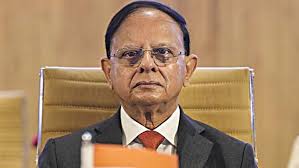
Air Pollution: PM Modi’s Principal Secretary Chairs High-Level Task Force, Emphasises Action Against Stubble Burning
In a critical move to tackle the looming air pollution crisis in Delhi-NCR ahead of the winter season, Dr. P. K. Mishra, Principal Secretary to the Prime Minister, chaired a High-Level Task Force meeting at the Prime Minister's Office (PMO) on September 23,2024.
The meeting aimed to evaluate the preparedness of various stakeholders and ensure timely action to combat the declining air quality, exacerbated by stubble burning, vehicular emissions, and construction dust.
The meeting's key focus was the stringent implementation of the Graded Response Action Plan (GRAP), which outlines specific measures to curb pollution as air quality deteriorates during the colder months. Dr. Mishra emphasized the importance of strict enforcement and coordination across all agencies to mitigate the rise in pollution levels.
Stubble Burning: A Major Challenge
A detailed report by the Chairman of the Commission for Air Quality Management (CAQM), Shri Rajesh Verma, outlined the forecast for paddy stubble generation, a significant contributor to Delhi-NCR's air pollution. Punjab is expected to generate 19.52 million tonnes of paddy straw, while Haryana is projected to produce 8.10 million tonnes. Both states have pledged to eliminate stubble burning, with Punjab planning to manage 11.5 million tonnes of crop residue through in-situ methods (on-site management) and the remainder through ex-situ solutions (off-site).
Haryana, in a similar effort, will manage 3.3 million tonnes in-situ, with the rest handled ex-situ. The availability of over 1.50 lakh crop residue management (CRM) machines in Punjab, supported by 24,736 Custom Hiring Centres (CHCs), and 90,945 machines in Haryana with 6,794 CHCs, will play a crucial role in these efforts.
Push for Industrial and Vehicular Emission Reductions
The task force also discussed measures to reduce industrial emissions. CAQM reported that 220 out of 240 industrial areas in NCR have now switched to gas infrastructure, with the remaining areas to be connected soon. Additionally, the group reviewed dust pollution from construction and demolition (C&D) activities, which are now being monitored remotely through a web portal requiring mandatory registration for projects over 500 square meters.
Dr. Mishra directed the Chief Secretaries of Punjab, Haryana, and Uttar Pradesh to ensure robust monitoring of stubble burning and to promote the use of CRM machines. He also called for strengthening the supply chain for ex-situ management and urged small industries to explore paddy straw briquetting and pelletizing operations, enhancing the economic value of the residue. Penalties for non-compliance will be enforced.
Transport and Green Initiatives
Addressing vehicular emissions, Dr. Mishra urged the Chief Secretaries of NCR states to expand their electric bus fleets under the PM eBus Sewa Scheme, which aims to introduce 10,000 e-buses across the country. He highlighted the scheme's potential to significantly reduce urban pollution levels and improve public transportation in the region.
Further, he encouraged the adoption of the "Ek Ped Maa Ke Naam" program, a tree-planting initiative to help green the city and involve citizens in environmental efforts. Dr. Mishra stressed that the sentimental value of this program should resonate with every individual, making it a crucial part of the city's green strategy.
Additional Measures: Firecracker Ban and Biogas Push
In response to the additional threat posed by firecracker pollution, especially during festive seasons, state governments and law enforcement agencies were instructed to strictly enforce bans and restrictions. Dr. Mishra also urged the Ministry of Petroleum and Natural Gas to expedite the collection of biomass and accelerate the construction of compressed biogas (CBG) plants to reduce pollution caused by biomass burning.
The task force meeting underlined the importance of coordinated and immediate action across all sectors to prevent the recurrence of severe air pollution episodes that have previously plagued Delhi-NCR during the winter months.